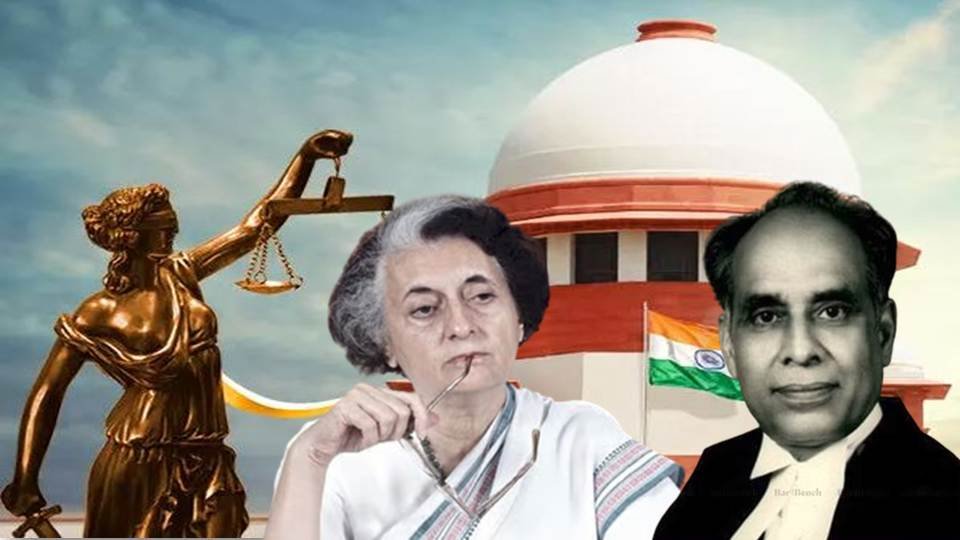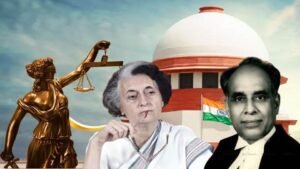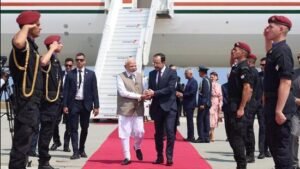
‘Where Fear Is, Justice Cannot Be’: The Intrepid Mr. H.R. Khanna
Why in News?
Justice H.R. Khanna’s legacy is being revisited in light of renewed discussions on constitutional morality, judicial independence, and the Emergency of 1975. His principled dissent in the ADM Jabalpur v. Shivkant Shukla (1976) case is considered one of the most courageous acts in Indian judicial history.
This article is especially important for aspirants of CLAT 2026, UPSC, and other law exams as it links constitutional interpretation, Article 21, rule of law, and judicial dissent, offering both legal depth and historical insight.
Introduction
Justice Hans Raj Khanna, a Supreme Court judge, etched his name into Indian constitutional history during the Emergency (1975–77). When civil liberties were suspended and the Executive gained overwhelming control, Justice Khanna stood alone in defending the fundamental right to life and liberty, even in the absence of Article 21. His lone dissent in the ADM Jabalpur case was a moral and constitutional high point, despite costing him the Chief Justiceship of India.
Point-Wise Summary of the Article
- Emergency Period and Judicial Confrontation
- The Emergency (June 1975 – March 1977) saw over 1 lakh people imprisoned without trial, including major Opposition leaders.
- Fundamental rights under Article 21 (Right to Life and Liberty) were suspended.
- During this time, the judiciary came under pressure from the Executive.
- ADM Jabalpur v. Shivkant Shukla Case
- Also called the Habeas Corpus case, it questioned whether a person could approach the court to seek release from unlawful detention during Emergency.
- A five-judge Constitution Bench of the Supreme Court ruled 4:1 in favor of the Government, denying judicial remedy during the Emergency.
- Justice H.R. Khanna was the sole dissenter.
- Justice Khanna’s Historic Dissent
- He argued that even if Article 21 was absent, no State has the right to take away life or liberty without due process of law.
- In his autobiography Neither Roses Nor Thorns, he narrates how he asked a hypothetical question in court: “Would there be no remedy even if a police officer killed a man out of personal enmity?”
- The Attorney General shockingly answered “No remedy” during Emergency, which Justice Khanna termed “shocking to the conscience”.
- Article 21’s Supremacy and Natural Law
- Justice Khanna stated that even without Article 21, the right to life is an inherent human right and cannot be suspended.
- He wrote: “Supposing Article 21 was not there in the Constitution, no state or policeman could deprive a person of life or liberty without authority of law.”
- Cost of Conscience: Loss of Chief Justiceship
- Justice Khanna was due to become the Chief Justice of India by seniority.
- Before pronouncing his dissenting judgment on April 28, 1976, he told his wife and sister: “This will cost me the Chief Justiceship.”
- On January 28, 1977, Justice Mirza Hameedullah Beg, junior to him, was appointed CJI instead.
- Justice Khanna resigned immediately in protest.
- Aftermath and Recognition
- Lawyers across India boycotted courts to protest the government bypassing Khanna.
- The New York Times and many international voices praised his courage.
- Justice Khanna was admired even by some Congress MPs who quietly supported his moral stand.
- Legacy and Farewell Address
- At his farewell dinner, he warned:
“There can be no greater indication of the decay in rule of law than a docile Bar, a subservient judiciary, and a society with a choked conscience. Where fear is, justice cannot be.”
Key Constitutional Concepts for CLAT
Term/Article | Explanation |
Article 21 | Protects life and personal liberty. No one shall be deprived of it except by procedure established by law. |
Habeas Corpus | A writ to protect against unlawful detention. Literally means “produce the body”. |
ADM Jabalpur Case (1976) | SC ruled that during Emergency, the right to file habeas corpus under Article 21 stands suspended. |
Judicial Independence | Judges must be free from political or executive pressure. Justice Khanna’s dissent is a shining example. |
Emergency Provisions (Article 352, 359) | Empower the state to suspend certain fundamental rights during national crisis. |
Notes for CLAT 2026 and Legal Interpretation
Justice Khanna’s Interpretation:
- Emphasized that natural justice and human rights are not merely constitutional but intrinsic to human dignity.
- Upheld the doctrine of constitutional morality and the supremacy of law over executive expediency.
CLAT Strategy Tip:
- Quote Justice Khanna’s dissent in essays or answers related to Emergency, Fundamental Rights, or Judicial Ethics.
- His stance is frequently referenced in Landmark Judgments sections.
Impact on Indian Legal System
- Restoration of Article 21’s sanctity post-Emergency through the Maneka Gandhi v. Union of India (1978) case.
- ADM Jabalpur ruling was effectively overruled and considered a “dark chapter” in constitutional law.
- Justice Khanna’s dissent is now treated as the correct constitutional position.
Relevant Quotes for Legal Reasoning
- “Where fear is, justice cannot be.” – H.R. Khanna
- “Unanimity at the cost of conscience is not desirable in the apex court.”
- “No authority can deprive life and liberty without legal sanction – even in the absence of Article 21.”
Analysis for CLAT and UPSC Aspirants
Feature | Explanation |
Moral Courage | Justice Khanna sacrificed personal advancement for constitutional integrity. |
Judicial Integrity | Reinforces the principle of dissent and courage in constitutional adjudication. |
Learning for Law Aspirants | Emphasizes the significance of interpreting the Constitution in favor of individual rights, especially during political turmoil. |
Conclusion
Justice H.R. Khanna’s fearless dissent during one of India’s most authoritarian phases is a reminder of the moral responsibility of judges and the imperative to protect constitutional rights, especially in times of crisis. His principled stand, at great personal cost, is now immortalized in Indian legal history and offers valuable lessons for all aspiring lawyers and guardians of justice.
Justice Khanna’s life reminds us that the judiciary is the last line of defense for civil liberties. His dissent is not just a judgment — it’s a legacy.






